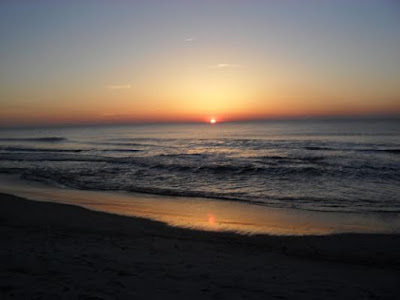His name was Alex. In the 1970s I was a preschool teacher at
the Narragansett Parents’ Cooperative School on the seacoast of Rhode Island.
Alex needed us in a unique way. He had a congenital
heart condition. His parents and his doctors couldn’t operate on his heart
until he was big enough to withstand it. He was 3, going on 4.
Alex’s older brother Jess went to the primary class, upstairs, with the bigger kids. He walked with a strut, leading with his chest, arms
swinging fisted at his sides. His brown hair was tight and curly, giving him
the look of a bull calf. But Alex was small, pale and thin. The tiny blue veins
in his forehead and wrists were visible. My co-teacher Sue and I, plus
volunteer parents, took turns rocking him in the big chair in the corner of the playroom
when he was drowsy from his medication or just having a down day.
“Can you take Alex for a while?”
We’d wrap him in a blanket. I spent hours watching Alex’s face as he dozed with his eyelids half-closed. His eyes were the shade of a midwinter sky,
gray and soft. His pupils would move lazily as he dreamed. Was Alex flying
somewhere? Love poured from me, from each of us, as we held him. No one ever
said “love him.” Nobody had to.
Alex’s Mom was named Mary Ann. She had to work full time, as her husband did, to save for Alex’s surgery and his high medical bills. She
trusted all of us to look after him and we did. Sometimes I babysat for Alex
and Jess at their home.
This is my sketch of Alex from
1977. He always wore a too-big baseball hat and a turtleneck sweater.
I left the Parents’ Co-op to do other things. A couple of
years later I was at a convenience store and saw Jess swagger by my aisle with a bag of
Doritos. Another kid was behind him, a little shorter, but with the same barrel
chested, belligerent stride. The image of his brother. I blinked. Alex?
The kid gave me a blank look. Those grey eyes. He was Alex
alright. A healthy, thriving version of the wan boy I’d held in my arms for
almost a year. But he didn’t recognize me. “It’s Cathy. Don’t you know me?”
Alex walked on. The boys were with their father. They took their places next to
him at the cashier’s line, their backs to me.
Little kids forget when they get big. Almost-6 is eons away
from almost-4. The surgery had been successful. Alex was well. But I felt ripped off.
Where was my reward for my part in this miracle? For all that love?
I recall the hours I spent with my kids when they were
babies, glued to the spot where they slept, never tiring of gazing at them.
Maybe this utter surrender to our infants, of memorizing their scent, their
sounds, every aspect of face and body is a tribal act. A claiming. We will
always be able to identify them instantly, pick them out in any gathering of
children. Something else seems to grow from this vigil – a protective urge that
refuses to fade, long past the time that kids become adults. Love is probably
the best instinct we possess. And it calls on the best in us, often demanding a
lot of work to achieve its goals.
I had loved Alex. Warmth and protection radiated from me
during those dedicated, daily rocking chair hours. But I hadn’t understood, as
a young woman, that the ability to love is in itself a privilege. I hadn’t the
wisdom to realize that the Alex-sighting at the convenience store was, in
itself, my reward for the time I’d given him. And he had given me. His image
seems, in this bleak February, a bittersweet reminder of the power of Love.
( Words and images copyright Cathy Larson Sky)









